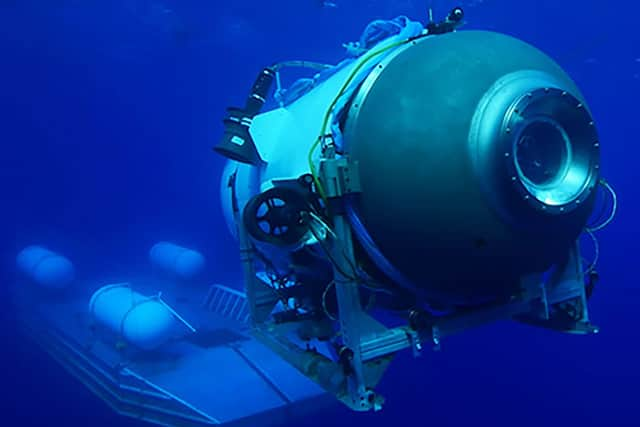‘Presumed human remains’ found in wreckage of Titan submersible after fatal implosion
and live on Freeview channel 276
Presumed human remains have been recovered from the wreckage of the Titan submersible, the US Coast Guard (USCG) has said.
The discovery comes after the vessel suffered a “catastrophic” implosion last week while attempting to view the wreck of the Titanic, killing the five men on board, including three British citizens.
Advertisement
Hide AdAdvertisement
Hide AdBritish adventurer Hamish Harding and father and son Shahzada and Suleman Dawood were killed in the implosion, alongside OceanGate Expeditions’ chief executive, Stockton Rush, and French national Paul-Henri Nargeolet.


Large pieces of debris from Titan were transported to St John’s harbour on Wednesday (28 June) by the Horizon Arctic ship, where it was seen being unloaded by a crane.
The USCG said it has received debris and evidence from the sea floor at the site of the vessel’s implosion, with the suspected human remains to be formally analysed by medical professionals.
Speaking after the evidence was recovered, the Marine Board of Investigation’s (MBI) chairman, Captain Jason Neubauer, said: “I am grateful for the co-ordinated international and inter-agency support to recover and preserve this vital evidence at extreme offshore distances and depths.
Advertisement
Hide AdAdvertisement
Hide Ad“The evidence will provide investigators from several international jurisdictions with critical insights into the cause of this tragedy. There is still a substantial amount of work to be done to understand the factors that led to the catastrophic loss of the Titan and help ensure a similar tragedy does not occur again.”


The USCG said the MBI intends to transport the evidence to a port in the US where it will be able to facilitate further analysis and testing. The MBI will continue to collect evidence and witness interviews to inform a public hearing about the incident, the USCG added.
Pelagic Research Services, whose remote operating vehicle (ROV) discovered the debris fields, said on Wednesday its team is “still on mission”. A statement said: “They have been working around the clock now for 10 days, through the physical and mental challenges of this operation, and are anxious to finish the mission and return to their loved ones.”
Royal Canadian Mounted Police (RCMP) previously said it is looking into the five deaths. Safety investigators from the Transportation Safety Board (TSB) of Canada made inquiries on Titan’s main support ship, the Polar Prince, after it docked in St John’s harbour on Saturday (24 June).
Advertisement
Hide AdAdvertisement
Hide AdThe Titan submersible lost contact with tour operator OceanGate Expeditions an hour and 45 minutes into the two-hour descent to the wreckage, with the vessel reported missing eight hours after communication was lost.
Concerns over the safety of the vessel have emerged since the tragedy, with emails from Mr Rush, who was killed in the implosion, emerging earlier this week which dismissed such concerns over the deep-sea vessel.
The exchanges with deep-sea exploration specialist Rob McCallum, reported by the BBC, show the company’s chief executive say he was “tired of industry players who try to use a safety argument to stop innovation”. Mr McCallum told Mr Rush he was “mirroring that famous cry” of the Titanic’s builders: “She is unsinkable.”
Captain Jason Neubauer, who is chairing the US Coast Guard investigation into the implosion of the vessel, said the investigation could lead to tougher regulations. He told reporters: “It’s an opportunity to learn from the incident and then work with our international partners worldwide to… improve regulations or international safety standards so that they have improved oversight over these operations and to prevent a similar occurrence.”
Comment Guidelines
National World encourages reader discussion on our stories. User feedback, insights and back-and-forth exchanges add a rich layer of context to reporting. Please review our Community Guidelines before commenting.
